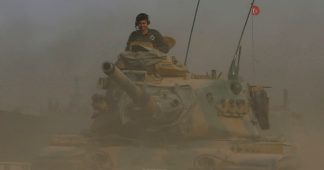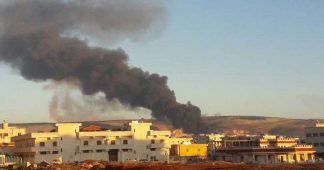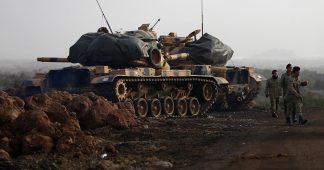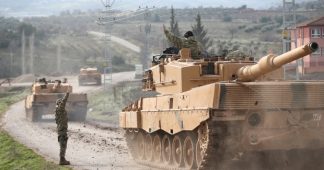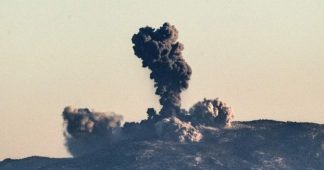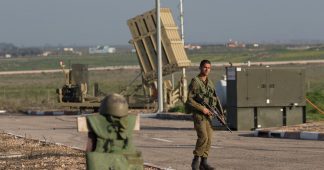By Paul Iddon
22/2/2018
On Tuesday, pro-Syrian government forces, also known as Syrian National Defense Forces (NDF), arrived in the Kurdish enclave of Afrin following calls by the Kurds there for Damascus to defend Syria’s international border against Turkey’s ongoing incursion. The deployment is a major development, the outcome of which is far from clear.
Turkey warned Damascus against sending forces to fight on the side of the Syrian Kurdish People’s Protection Units (YPG) defending Afrin. However, it also said it would welcome a regime takeover of Afrin if it removed the YPG from the equation, which would fulfill Turkey’s primary objective there.
Professor Joshua Landis, a Syria specialist from the University of Oklahoma, argued just before this deployment that it could well constitute “a win-win for everyone.”
“Turkey wins because its YPG problem in Afrin would be solved,” he told Rudaw English. “The Kurds win because they would not be defeated by a hostile military and would thus save life and home. The Syrian government would win because it restores its sovereignty over another region of Syria and would show that it can serve as a protector rather than threat to local populations.”
Even the United States and Russia would benefit he argues, “because they can state that they have worked for stability in Syria.”
The only stumbling block Landis foresees is the US government “dilemma” over “whether it weighs stability in Syria over its goal of rolling back Iran.”
“Many in Washington will see any deal that benefits the Syrian government to be a tantamount to appeasement of Iran,” he concluded.
Aaron Stein, a Resident Senior Fellow Rafik Hariri Center for the Middle East at the Atlantic Council think-tank, believes it’s “too early to tell” if Damascus will actually take control over Afrin from the YPG.
“I doubt the YPG will be subordinate to the NDF’s command structure, but we’ll have to see how this plays out,” he told Rudaw English.
The Kurds called on the regime to defend Afrin’s borders, which they assert are legally and rightfully part of Syria’s international border – implying that they will give the NDF certain positions from which to fight in defense of the canton rather than give them full control over the canton itself.
Also, since Ankara has already targeted NDF positions in Afrin shortly after their deployment there it would make little sense for the NDF to risk clashing with the YPG in an attempt to take control over Afrin while they’re both being attacked by the Turks. (It’s also worth remembering that the YPG have clashed with NDF fighters in their regime enclaves in the Kurdish cities of Qamishli and Hasakah in the past, meaning to the Kurds these forces are a lesser evil to Turkey at best.)
“I think the most interesting thing about this is the Russian-Regime dynamic,” Stein said.
“It appears as if the regime defied Moscow and deployed militias in to Afrin in defiance of a separate Russian-Turkish agreement to facilitate the conduct of Olive Branch,” he elaborated. “The question, now, is whether Russia will be forced to choose between Ankara and Damascus, as it seeks to navigate its own troubles in the Syrian civil war.”
Moscow essentially acquiesced to the Turkish Olive Branch operation when it began on January 20 and pulled out the small force of military police it had previously deployed to the canton to de-conflict clashes between Turkey’s Syrian militiamen proxies and the YPG, resulting in accusations of betrayal from the latter.
Russia has the power to close Syria’s northwestern airspace, as it reportedly did between February 5 and 9 after one of its warplanes in neighbouring Idlib province was shot down. Turkish airstrikes have continued unabated ever since.
If Damascus cannot deter the Turkish Air Force from bombing Afrin by itself, then the NDF deployment is unlikely to have a hugely significant impact on the battlefield. In mid-November 2016, according to a report in Hurriyet news at the time, a Syrian regime threat to shoot down Turkish jets, after they bombed and killed a large number of YPG fighters the preceding month, did briefly deter the Turkish Air Force. However, upon consulting Moscow on this issue the Turks were able to resume providing air support to their forces against Islamic State in the al-Bab battle and successfully conclude their Euphrates Shield operation late last March.
If the Russians refuse to support Damascus’ current action, for Stein’s aforementioned reasons, then Ankara may feel emboldened to target any Syrian air defenses that might hinder its domination of the skies above Afrin – the regime reportedly deployed anti-aircraft missiles to front-line positions in both Aleppo and Idlib provinces early this month.
A YPG spokesperson told Al-Monitor that if it weren’t for the aerial bombardments of Afrin they are confident they could drive out the Turkish-led forces “in no time.”
Stein concludes that the outcome of this latest development will likely be predicated upon “whether Turkey will risk escalation, or whether Moscow will try and control this from spinning out of control.”
Published at http://www.rudaw.net/mobile/english/analysis/21022018
